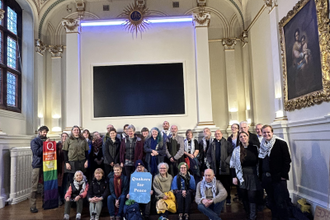Conference on impact of war on environment

Anna Blackman
The Conflict and Environment Observatory (CEOBS) hosted a hybrid conference in Oxford on the theme of 'Military and Conflict GHC Emissions: From Understanding to Mitigation' on 26 September. The conference expanded on the work of the Military Emissions Gap project, a collaboration between the CEOBS and Concrete Impacts, a project funded by the UKRI-Economic Social Research Council run by researchers from Queen Mary, Lancaster, and Durham universities.
The Military Emissions Gap project focuses on improving transparency of the reporting of military emissions, which are currently voluntary within the United Nations' Framework Convention on Climate Change (UNFCC). However, militaries are large producers of greenhouse gas emissions both during times of peace and war; the CEOBS estimates that militaries are responsible for 5.5% of global emissions. As reporting is not compulsory, this also means that the military sector has lagged behind in addressing their emissions.
The conference aimed to address these issues, drawing together international experts which included university academics, research institutions and think-tanks, scientists, industry experts, campaigners, as well members of the military. Panels focused on the overview of the military carbon footprint, the military's organisational emissions, how the military can decarbonise, as well as lessons from the war in Ukraine. Attendees also came from varied international backgrounds, including academics, civil society groups, such as representatives from the charity sector, peace groups, such as Campaign Against the Arms Trade, Movement for the Abolition of War, and Veterans for Peace, and faith groups, such as the Fellowship of Reconciliation, as well as my own presence representing the Columban Missionaries. The diverse make-up of speakers and participants led to an enriching, thought-provoking, and at times challenging, discussion.
Several key themes emerged throughout the day. Clearly emphasised was the difficulty in tracking military emissions, and therefore, difficulty in challenging them. Several speakers raised the issue of inadequate methodologies currently being utilized, such as the fact that NATO reporting excludes NATO-led operations, or how military fuel use was not covered by either the Kyoto Protocol or the Paris Agreement. Also noted was the difficulty in accurately attaining data, for example, due to arms companies retaining information as "trade secrets", militaries themselves having inaccurate records, particularly during wartime when emission recording is not a priority, or information kept confidential due to national security. Questions were also raised about whose responsibility it is to report emissions, for instance when looking at foreign bases or occupied territories.
This meant that researchers had to think creatively in trying to estimate emissions, and there were impressive examples of this. This included methods such as utilizing civilian data, for example on aviation fuel use, to try to account for military usage, and looking at purchasing records where available. Emphasis was placed on taking a life-cycle assessment approach, and taking a wider approach to include indirect emissions that support military operations, such as contractors and civilian actions, such as building and construction. Speakers highlighted the need to assess long-term impacts of militaries such forest fires caused by conflict, the use of concrete walls used to segregate during war, and the carbon footprint of rebuilding infrastructure after war damages.
A great deal of discussion also focused on how the military could cut emissions, for example, by making weapons "greener" or recycling military equipment, such as using ammunitions in civil explosives. Also emphasised was the importance for the military to become more eco-conscious in order to maintain legitimacy within society, maintain freedom to operate around the world, as well providing a tactical advantage over other militaries who continue to use fossil fuels. Examples were given of how the UK military is already working towards Net Zero. However, doubts were raised about UK military targets being sufficiently ambitious, reflecting on the House of Commons recent report on defence and climate change. Whilst there has been an overall downward trend in UK military emissions, it was argued this has largely been due to the reduction of military activity since the 1980s and changes in the national grid, with little evidence that emissions have been falling due to concrete actions taken by the Ministry of Defence.
The role of the military in tackling the environmental crisis was also questioned. Noted were the difficulties in trying to balance greening the military with national security and questions were raised about whether countering the crisis was really the role of the military. Others, however, spoke of the important role that militaries play in responding to climate change adaption and climate disaster relief.
Less discussed was peace and demilitarization, arguably the most effective way to cut military emissions. Several important points were raised, however, especially by members of the audience. It was argued that it was not a foregone conclusion that the world would necessarily become more violent or insecure, and indeed, if we were truly able to work together to achieve net zero this would suggest a world in which peaceful negotiation was a reality. Thought was also given to the carbon footprint of war, versus the carbon footprint of negotiation.
Others spoke of the need to eliminate the causes of conflict, including battles over resources which should be shared rather than defended, an issue which cannot be solved by greener weaponry. War was also framed as a 'carbon project' that affects everyone, as we all share one climate. Calls were made to include the climate degradation as part of war damages, holding aggressors responsible for war and occupation-related emissions.
Signs of hope were evident in the impressive and creative work being undertaken by participants in highlighting, and working to end, the military emissions gap, as well as indications that the UK military was working alongside researchers in this process. Noted was a 40% increase in the reporting of emissions by the UK military over the last 20 years, and that the notion that the military should be exempt from reporting and adjusting their emissions was now being tested.
However, it remains clear that there is still a great deal of work to be done in this area. Supporting creative research in this area is of course important, but advice was also given to attendees to stay informed about what their national military is doing as well as pressuring policy makers through advocacy and voting. This call is echoed in Laudate Deum in which Pope Francis speaks of the vital role of activism "from below" that pressures 'the elites of power'. At a time when the Prime Minister is weakening our commitments to Net Zero, this takes on increasing urgency. I would add here, the importance of campaigning for nonviolence, peaceful resolutions and demilitarisation.
In order to work in harmony to solve the environmental crisis, as Pope Francis argues in Laudato Si' (14), 'we require a new universal solidarity'. This seems impossible to achieve whilst we continue to prepare for conflict with one another.
Anna Blackman is a Lecturer in Catholic Religious Education at the School of Education, University of Glasgow. She is also a theologian and volunteer member of the Columbans' Justice, Peace and Ecology Team.
LINKS
Conflict and Environment Observatory: https://ceobs.org/
Conference 'Military and Conflict GHC Emissions: From Understanding to Mitigation'
https://ceobs.org/conference-military-and-conflict-ghg-emissions-from-understanding-to-mitigation/


















